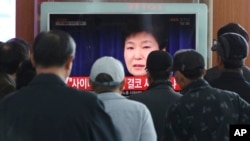South Korean President Park Geun-hye's administration has been roiled by an influence-peddling scandal, and the problem only worsened this week when opposition lawmakers signaled they may pursue impeachment proceedings if the president does not resign.
Park’s Saenuri Party lost their majority in the National Assembly after April elections. The corruption scandal has shrunk her approval ratings to 5 percent, according to the polling group Gallup Korea. But it's unclear if there are enough votes to impeach her.
The main opposition Minjoo Party of Korea said it is considering impeachment proceedings. Minjoo Party Chairwoman Choo Mi-ae said that if the president refuses to step down, “we will take measures to suspend the constitutionally guaranteed authority given to the president step by step.”
The Korea JoongAng Daily says Choo referred to Park’s continued efforts to remain in office as a “force of evil.”
Despite Choo’s strongly worded statement, the vote appears to depend on whether any members of Park's party join the opposition to impeach her.
Of the 300 members in the National Assembly, 165 belong to opposition parties. When factoring in independent legislators, a total of 171 votes could be cast for impeachment.
However, that falls 29 short of the requisite two-thirds majority needed to trigger the action. This means that Choo must foster a coalition that includes at least 29 members of Park’s Saenuri Party.
Saenuri Chairman Kim Moo-sung said November 13, “My view is that the president should eventually be impeached in the name of the people,” so securing the extra votes may be a possibility.
If that does occur, the Constitutional Court would have 180 days to deliberate. The court would need six of the nine justices to vote in favor to approve impeachment, but two members complete their terms in the first quarter of 2017. If those seats remain unfilled, it could create a situation where all but one justice would need to vote in favor of impeaching Park.
Park pursues international agenda
Embroiled in a corruption and influence-peddling scandal, Park has kept a relatively low profile as tens of thousands marched in Seoul on two consecutive weekends demanding her resignation, with additional nationwide protests scheduled for November 19.
Park named named new vice foreign and culture ministers and confirmed she will attend a trilateral summit in Tokyo December 19-20, highlighting a focus on foreign policy.
Chinese Premiere Li Keqiang and Japanese Prime Minister Shinzo Abe are expected to attend the summit.





